
views
Organizing the Content

Think about the goal of the eulogy. When you sit down to create an outline for your eulogy, consider your goals before writing anything down. First keep in mind the difference among a eulogy, obituary, and elegy. A eulogy is speech usually given during the visitation or wake that pays your mother tribute. An obituary is a short announcement of your mother’s passing that appears in the newspaper, while an elegy is a poem or song of lament. A eulogy is a speech containing a tribute to your mother's life, which may contain a brief story of your mother's life. Make your eulogy tell your own story about your mother rather than cater to what everyone else is telling you to write.

Brainstorm memories and facts. After you have determined the goal of your eulogy, start collecting material for it. Make a list of everything you can think of to use in the eulogy—funny anecdotes, facts about her life, favorite memories you shared, lessons she taught you, and so on. Questions you could ask yourself to help you brainstorm include, What one quality of my mother do I remember most? Try asking yourself, What is something my mother always used to do to comfort me? Once you have your list, whittle it down to stories and memories that achieve the goal you have set for the eulogy.

Interview your close relatives. Ask your relatives if they have any stories they want to contribute to the eulogy. More than likely, you will get quite a few anecdotes to add to your brainstorm list. Ask them questions like, What is your favorite memory of my mother? Another question could be, What life lessons did my mother teach you?
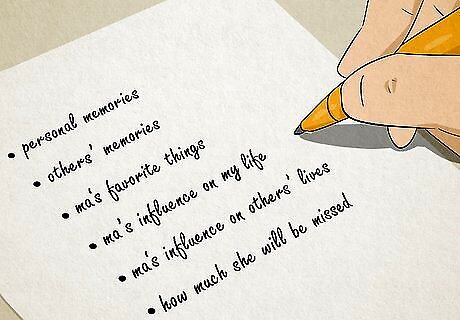
Organize the body in the outline. In the body, organize your anecdotes in a specific way, such as chronologically or in logical categories. Doing this will give your eulogy focus so that others can follow what you are saying. For example, instead of in order of occurrence, you could group your anecdotes by type: personal memories, others’ memories, her favorite things, her influence on your life, her influence on others’ lives, and concluding with how much she will be missed before giving the conclusion. You might also use poems or songs performed by other family members for the body.
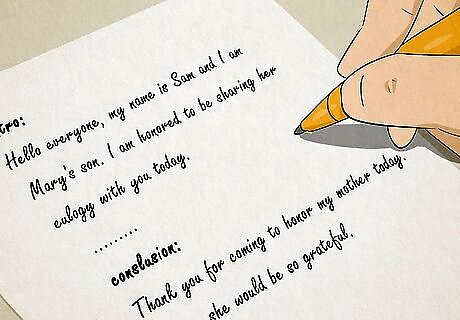
Have an introduction and conclusion. The introduction should open with a brief greeting to the crowd and an introduction of yourself, including your relationship to your mother. The conclusion should repeat the main theme of your eulogy. For example, you could open with, "Hello everyone, my name is Sam and I am Mary's son. I am honored to be sharing her eulogy with you today." You could end with, "Thank you for coming to honor my mother today. I know she would be so grateful."
Composing the Eulogy

Write for reading out loud. Consider that you will likely read your eulogy out loud at the visitation or wake for your mother. Use diction and vocabulary appropriate for this, such as thanking others for coming. Also makes notes indicating where pauses should occur. This means avoiding a formal tone. Focus on writing the way you speak. Simply reading a script to an audience can feel dry and ultra-formal, an effect you may want to avoid. Try writing your eulogy in a list format, leaving room for improvisation so that you are not constantly looking down at the paper.
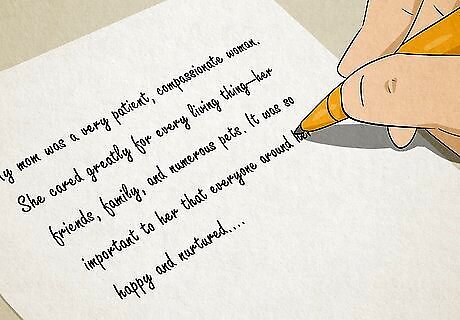
Begin with the body of the eulogy. Most pieces of writing have a beginning, middle, and end. For a eulogy, you need an intro, body, and conclusion. In order to produce an engaging introduction, start writing the body, then move to the conclusion before returning to write the intro. Writing in this order helps you figure out what you are going to say so that the introduction is more clear. Keep in mind that you will likely write several revisions before coming up with a copy that you are happy with. Ask relatives and friends to read over or listen to you read your rough drafts to help make the eulogy stronger.

Choose a tone for the eulogy. The tone for a eulogy does not have to be sad, although it certainly can be. Ask yourself some questions to determine what the mood and tone of your eulogy should be. For instance, how would your mother want you to feel? How do you want others to feel after hearing or reading your eulogy? Consider the personality of your mother. Was she vibrant and energetic? Warm and loving? Think about making the tone of your eulogy match your mother’s personality.
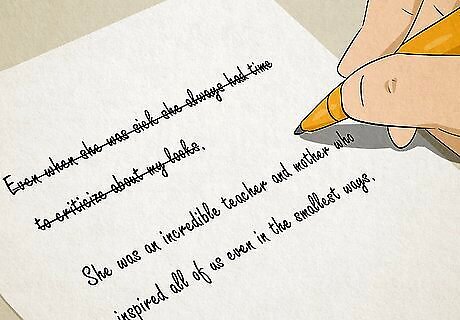
Understand what not to include. Knowing what a eulogy is can help you decide what things to leave out. For starters, think of a eulogy as a gift to your mother. Your gift will assist everyone close to her in processing the grief they feel. That being said, you can choose to filter out things that don’t fit this mold. You will probably want to exclude negative things. If you were angry with her when she passed, forgiving her before penning the eulogy can help you focus on positive aspects. Stay away from trivial facts that do not contribute to the main theme of your eulogy, such as her daily habits.

Avoid striving for perfection. Keep in mind that this eulogy does not need to be perfect in any way. View it as a way to honor your mother, and the funeral guests will appreciate it for this gesture. Take pressure off yourself to perform perfectly with this eulogy, which will help you speak from the heart. If you tend to be a perfectionist, try to lower your expectations by imagining how you would expect a sibling to do this, or another relative. Treat yourself as you would them (i.e., have compassion for mistakes).
Including Meaningful Extras
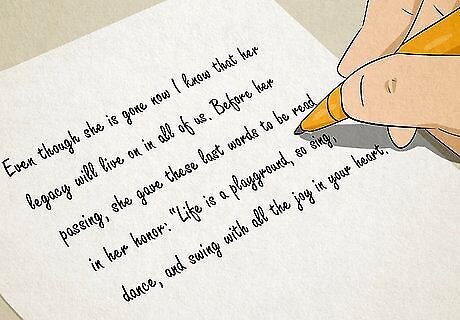
Share the legacy you believe she left. In the body of your eulogy, be sure to include the legacy you believe your mother is leaving behind. A legacy is what you hope she will be remembered for and what she would have been most proud for people to remember about her. Think about if your mother ever told you what she wanted to be remembered for, or ask others if she talked to them about this. If she never told anyone what she wished to be remembered for, think about the main theme of her life. What did she spend the most time doing? What did she sacrifice the most for? Is there anyone who is grateful to her for a service she performed? For example, your mother's favorite sayings or life philosophy, or what she said was her proudest achievement.

Detail some of her achievements. Talk about some of the greatest things your mother achieved. This does not have to be something grandiose like designing a famous building or doing something in the public eye. Perhaps you and your siblings are well-adjusted individuals, and that was a great achievement. Achievements can be both tangible and intangible.
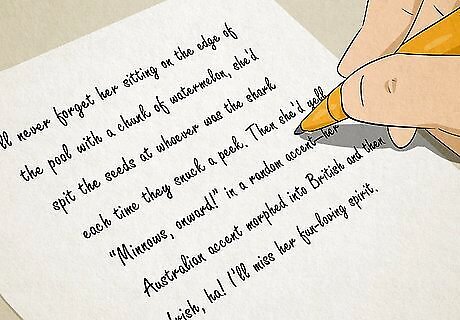
Bring in touching anecdotes. Anecdotes can be both touching and humorous. In fact, a mix of both creates a balance to your eulogy that relieves some of the heavy burden of grief. Be sure to include both on your brainstorm list. Get ideas from your friends and relatives.

















Comments
0 comment